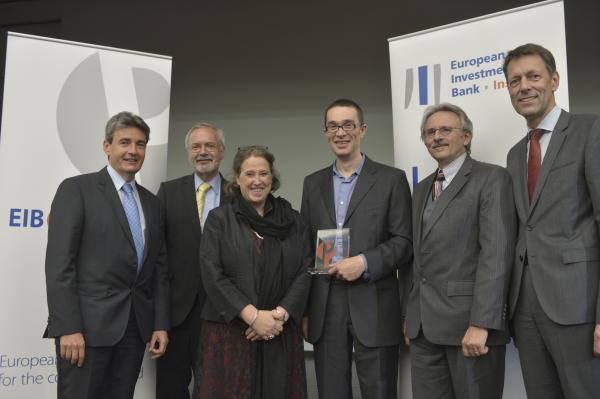
from left to right: Philippe de Fontaine Vive Curtaz, Vice President of the European Investment Bank and Chairperson of the EIB Institute’s Supervisory Board; EIB President Werner Hoyer, Professor Reinhilde Veugelers, KU Leuven (BE), Department of Management, Strategy and Innovation; Professor John Van Reenen, Recipient of the EIB Prize 2014, London School of Economics and Political Science; Guy Clausse, Dean of the EIB Institute; Georg Schütte, State Secretary in the German Federal Ministry of Education and Research.
EIB President Hoyer: EU must tackle the gap in competitiveness – Investment in innovation is key
Two internationally renowned European scholars in the field of managerial and technological innovation were awarded the EIB Prize for excellence in economic research today. Werner Hoyer, President of the European Investment Bank, presented the prize to Professor Nicholas Bloom from Stanford University and Professor John Van Reenen from the London School of Economics and Political Science during a ceremony at Freie Universität Berlin. Georg Schütte, State Secretary in the Federal Research Ministry, called the work a significant contribution to the discussion of growth.
The ‘EIB Outstanding Contribution Award’ – a EUR 40 000 prize – acknowledges the two scientists’ pioneering research on the effects of innovation on economic performance and inequality as well as their impact on public policy.
In his address, EIB President Werner Hoyer praised the scholars’ significant research on factors driving productivity inside businesses. “Professor Bloom’s and Professor Van Reenen’s work shows that the positive effect of technology spillovers is far greater than the negative effects of business being lost to market rivals. This is a significant result and implies that, if left alone, firms may invest too little in R&D. This gives direct justification to strong financial support of R&D projects, by the Bank and/or Member States, as is the case here in Germany.” President Hoyer underlined the importance of innovation and management for growth and the wealth of nations: “Research that helps us understand the incentives to innovate at the company level is therefore paramount.”
The EU Bank’s role, as mandated by its shareholders, the 28 EU member states, would reflect the shift from tackling the competitiveness gap between European regions caused by lack of basic infrastructures to, increasingly, addressing the gap between Europe and the rest of the world caused by under-investment in research and innovation.
Professor John Van Reenen, the Recipient of the Outstanding Contribution Award, presented in his ensuing lecture the challenges Europe is facing. Successes in European integration – the EU is the largest single market in the world – would be thwarted by continuously slow growth. Yet productivity and innovation could rekindle growth. “Major improvements are possible and desirable if opportunities are seized through structural reforms. However, these structural reforms must be accompanied by accommodating monetary and fiscal policies,” Van Reenen emphasised.
In his concluding remarks, Georg Schütte, State Secretary in the Federal Ministry of Education and Research, called the laureates’ applied research timely and crucial. “Your findings illustrate the close interdependence of growth and innovation. This resonates well with what we call qualitative growth – growth that is firmly grounded in education, research and innovation. The EIB Prize helps accentuate this qualitative dimension. It also points to the wealth and accomplishments of European research.”

Photographer: EIB ©Bernd Wannenmacher, FU Berlin
Download original